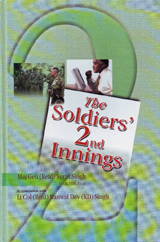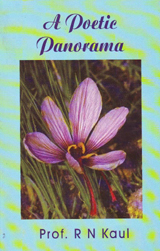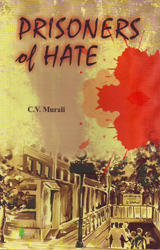|
SHORT TAKES
Soldiers, poets and prisoners of hate
Reviewed by Randeep Wadehra
The Soldiers’ 2nd Innings
by Maj Gen Surjit Singh (retd) &
Lt Col Kanwal Dev Singh (retd)
MacMillan.
Pages: xx+139. Rs 495.
 A majority of the
soldiers in our Armed Forces, especially in the Indian Army, retire
young. This is as true of the commissioned officers as it is of the
personnel belonging to the Other Ranks (ORs). While a significant
number of ORs — aka jawans — retire while in their
thirties, officers generally retire in their forties and fifties. The
latter, as this book admits, are economically secure while the former
have to struggle in Civvy Street for their survival. A majority of the
soldiers in our Armed Forces, especially in the Indian Army, retire
young. This is as true of the commissioned officers as it is of the
personnel belonging to the Other Ranks (ORs). While a significant
number of ORs — aka jawans — retire while in their
thirties, officers generally retire in their forties and fifties. The
latter, as this book admits, are economically secure while the former
have to struggle in Civvy Street for their survival.
Written partially in
anecdotal style, this book’s chapters, Angry Old Soldiers and
In Search of a Solution to the Problem, deal with
one-rank-one-pension-related issues. Another chapter, SWOT Analysis
and Classification of Jobs, gives details of the careers that
officers can take up post-retirement. There are separate chapters on
career opportunities in the corporate sector in India as well as
abroad. The book also outlines various pros and cons of writing wills.
It also describes their different types, like joint wills, mutual
wills etc, with their respective advantages and disadvantages.
How one wishes there was
a separate chapter on career prospects for ORs whose educational
profile has improved vastly over the years. There are impressive
numbers of law, engineering and management graduates among these
personnel who do not have the advantage of possessing "brass
credentials" to impress recruiters in the civil sector and thus
need guidance as well as inputs.
A Poetic Panorama
by Prof. RN Kaul
UBSPD.
Pages 70. Rs 105.
 Poetry is truly
"the Cinderella of the Arts". It has suffered much and has
still managed to survive, occasionally finding happiness and even
prosperity when noticed by a ‘prince’ like Vikram Seth. But, while
novels and short stories have attracted the best of talent and public
acclaim, poetry has generally remained a supplicant ever since its
former patron — the royalty —became extinct. In India, English
poetry’s status is worse than that of a scullery maid. Kaul is a
brave soul to practice this art when no publisher would touch a poetry
manuscript even with a barge pole. Poetry is truly
"the Cinderella of the Arts". It has suffered much and has
still managed to survive, occasionally finding happiness and even
prosperity when noticed by a ‘prince’ like Vikram Seth. But, while
novels and short stories have attracted the best of talent and public
acclaim, poetry has generally remained a supplicant ever since its
former patron — the royalty —became extinct. In India, English
poetry’s status is worse than that of a scullery maid. Kaul is a
brave soul to practice this art when no publisher would touch a poetry
manuscript even with a barge pole.
I quote below some of
the lines from Kaul’s anthology:
When the mind’s mirror
is pelted/By one’s own genes/ It gets cracked;
(The Mind’s Mirror)
Tear the veil apart/ To
shreds let it fall/ Widen the hole/ Let me look beyond/ And see the
eternal light; (The Eternal
Light).
However, most of his
poems are barely above the ordinary. Indian poetry in English needs to
be, in the late British poet Mathew Arnold’s words, "A
criticism of life under the conditions fixed for such a criticism by
the laws of poetic truth and poetic beauty".
Prisoners of Hate
by CV Murali.
Cedar Books.
Pages 259. Rs 195.
 Communal violence has
become a regular feature of our daily life. The politics of grievance,
competitive parochialism and other such factors have been vitiating
our societal environs for a long time now. Islamic terrorism is only
the latest manifestation of this hydra-headed monster. But how does
this phenomenon affect the individual in the street? We really don’t
have much literature — fiction or non-fiction —to come to any
conclusion. Therefore, this novel is a welcome addition to the meager
corpus. It tells us the story of three individuals Farhan, Sanjay and
Madhav reacting to the contemporary violence-ridden society. At least
three generations of their respective families have had experiences
over the time spanning pre-independent India to post-independent
India, which was partitioned at birth, leaving behind trails of death,
destruction and enduring animosities. Communal violence has
become a regular feature of our daily life. The politics of grievance,
competitive parochialism and other such factors have been vitiating
our societal environs for a long time now. Islamic terrorism is only
the latest manifestation of this hydra-headed monster. But how does
this phenomenon affect the individual in the street? We really don’t
have much literature — fiction or non-fiction —to come to any
conclusion. Therefore, this novel is a welcome addition to the meager
corpus. It tells us the story of three individuals Farhan, Sanjay and
Madhav reacting to the contemporary violence-ridden society. At least
three generations of their respective families have had experiences
over the time spanning pre-independent India to post-independent
India, which was partitioned at birth, leaving behind trails of death,
destruction and enduring animosities.
While Murali has
competently explored the protagonists’ mindscapes, his intervention
as a sutradhaar is really not required in the narrative.
|